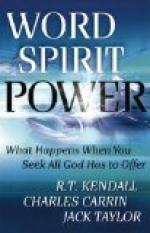The next mention of the Holy Spirit by John the Baptist is in reference to the baptism in the Holy Spirit and in fire. In order that the reader may have a clear understanding of this disputed and difficult subject, I shall present the testimonies of the four Evangelists in parallel columns [paragraphs]:
MATT. 3:10-12.
And even now the axe lieth at the root of the trees: every tree therefore that bringeth not forth good fruit is hewn down, and cast into the fire. I indeed baptize you in water unto repentance: but he that after me is mightier than I, whose shoes I am not worthy to bear: he shall baptize you in the Holy Spirit and in fire: whose fan is in his hand, and he will thoroughly cleanse his threshing-floor; and he will gather his wheat into the garner, but the chaff he will burn up with unquenchable fire.
MARK 1:7, 8.
And he preached, saying There cometh after me he that is mightier than I, the latchet of whose shoes I am not worthy to stoop down and unloose. I baptize you in water; but he shall baptize you in the Holy Spirit.
LUKE 3:9, 16, 17.
And even now the axe also lieth at the root of the trees: every tree therefore that bringeth not forth good fruit is hewn down, and cast into the fire.... John answered, saying unto them all, I indeed baptize you in water; but there cometh he that is mightier than I, the latchet of whose shoes I am not worthy to unloose; he shall baptize you in the Holy Spirit and in fire: whose fan is in his hand, thoroughly to cleanse his threshing-floor and to gather the wheat into his garner; but the chaff he will burn up with unquenchable fire.
JOHN 1:33.
And I knew him not: but he that sent me to baptize in water, he said unto me, Upon whomsoever thou shalt see the Spirit descending, and abiding upon him, the same is he that baptizeth in the Holy Spirit.
John is preaching to a mixed multitude composed of those who would accept his teaching and baptism, and of those who would accept neither. Many the former would become disciples of Jesus and receive the baptism of the Holy Spirit to qualify them to take up the work of the Master and carry it on until the church would be established and the gospel fully revealed to men. The baptism of the Spirit, a purely supernatural thing, was necessary to qualify them for this work. Others would “reject for themselves the counsel of God, being not baptized of him.” These should at last “have their part in the lake that burneth with fire and brimstone.” That such a division was meant by John becomes evident if we examine the context carefully. In the above parallel columns the reader will observe that Matthew and Luke use the expression “in the Holy Spirit and in fire.”




